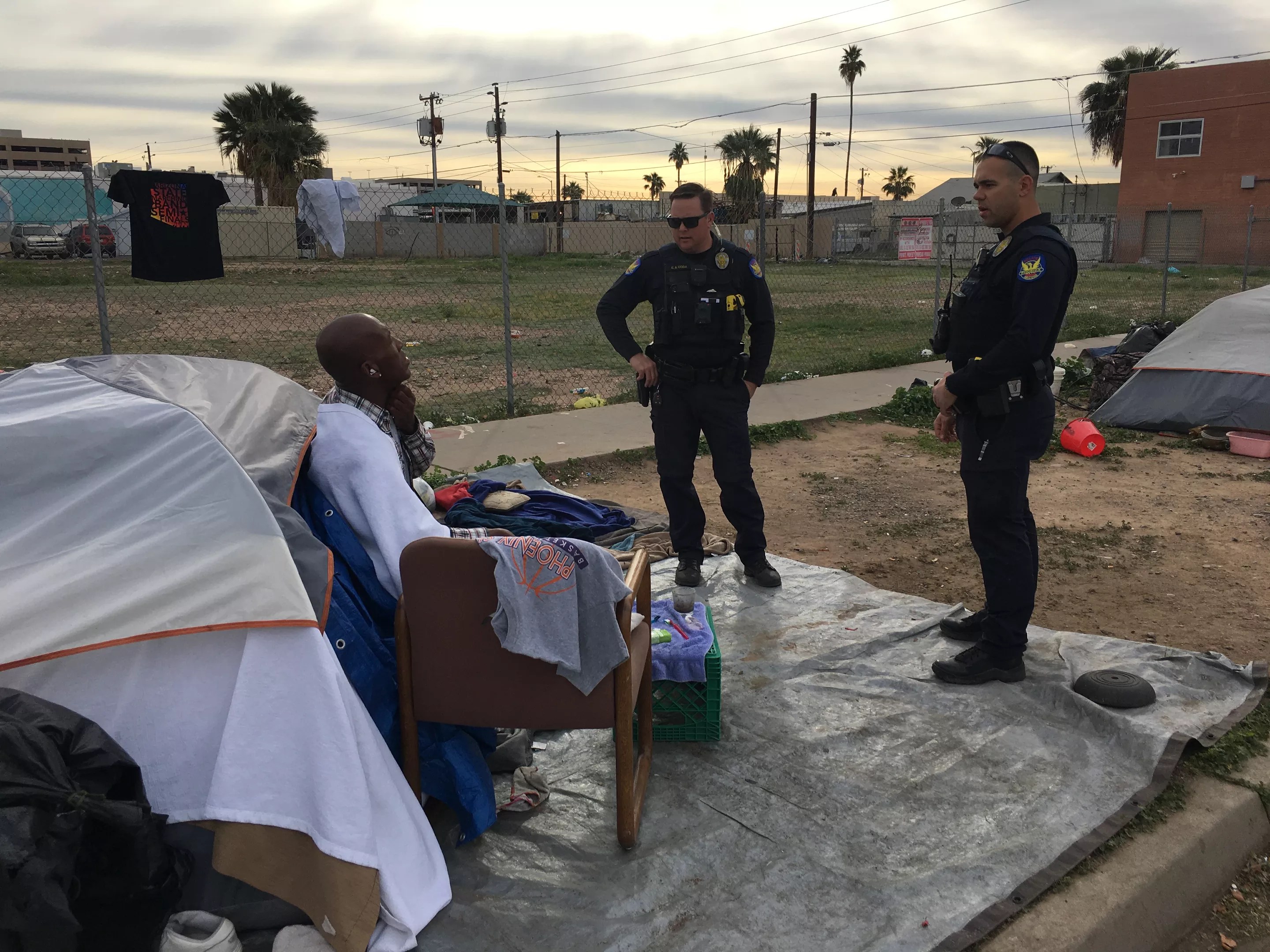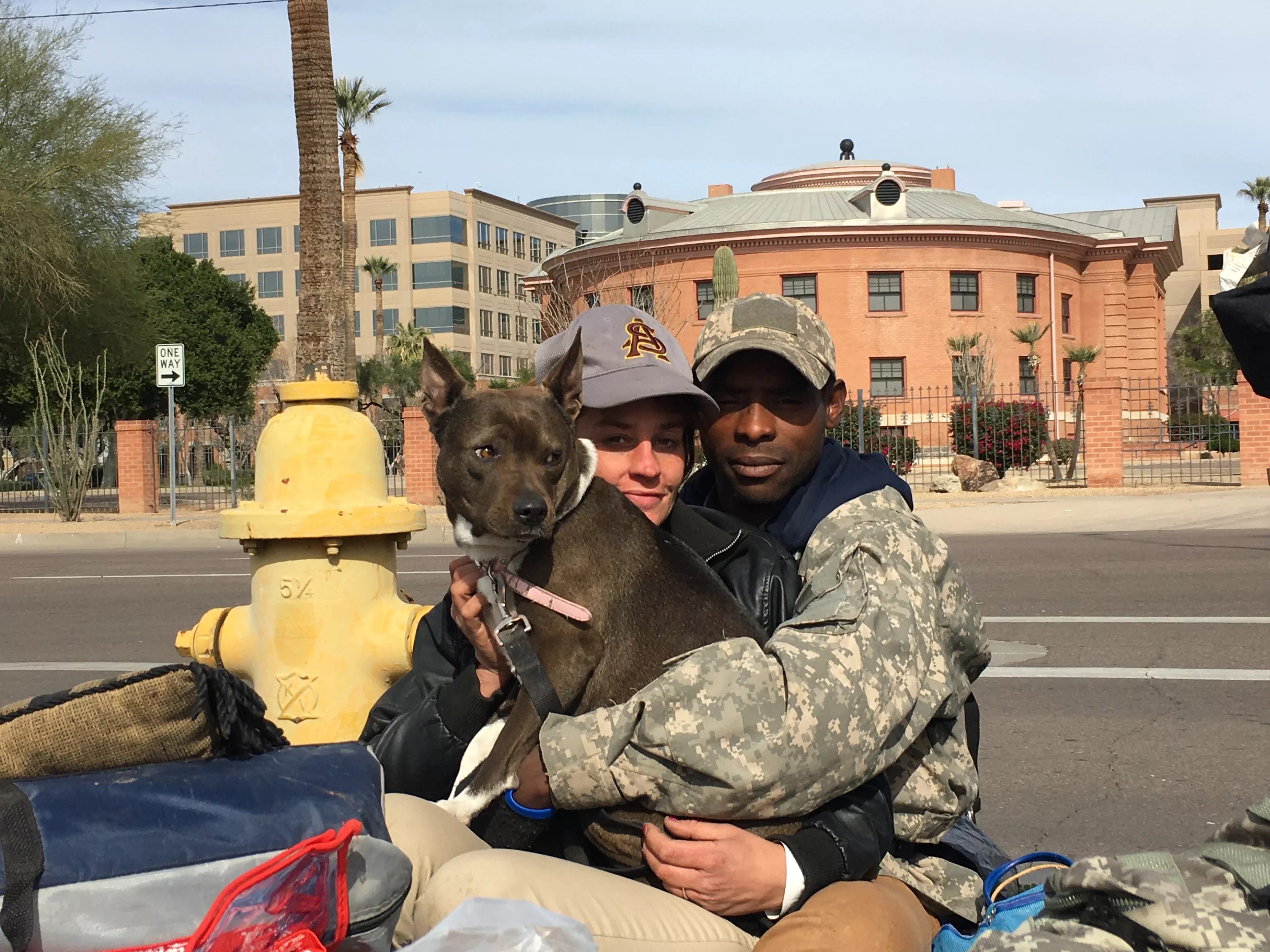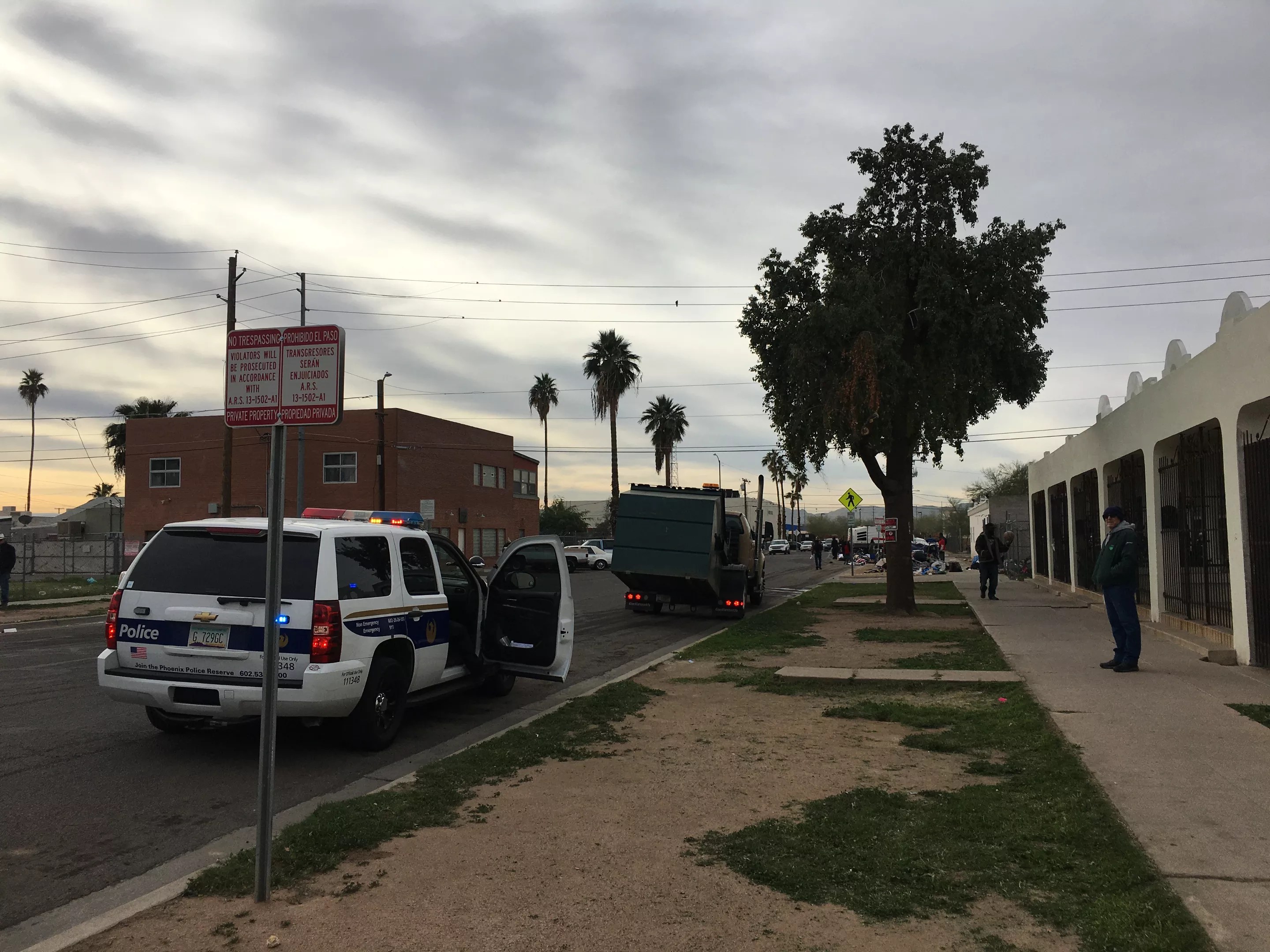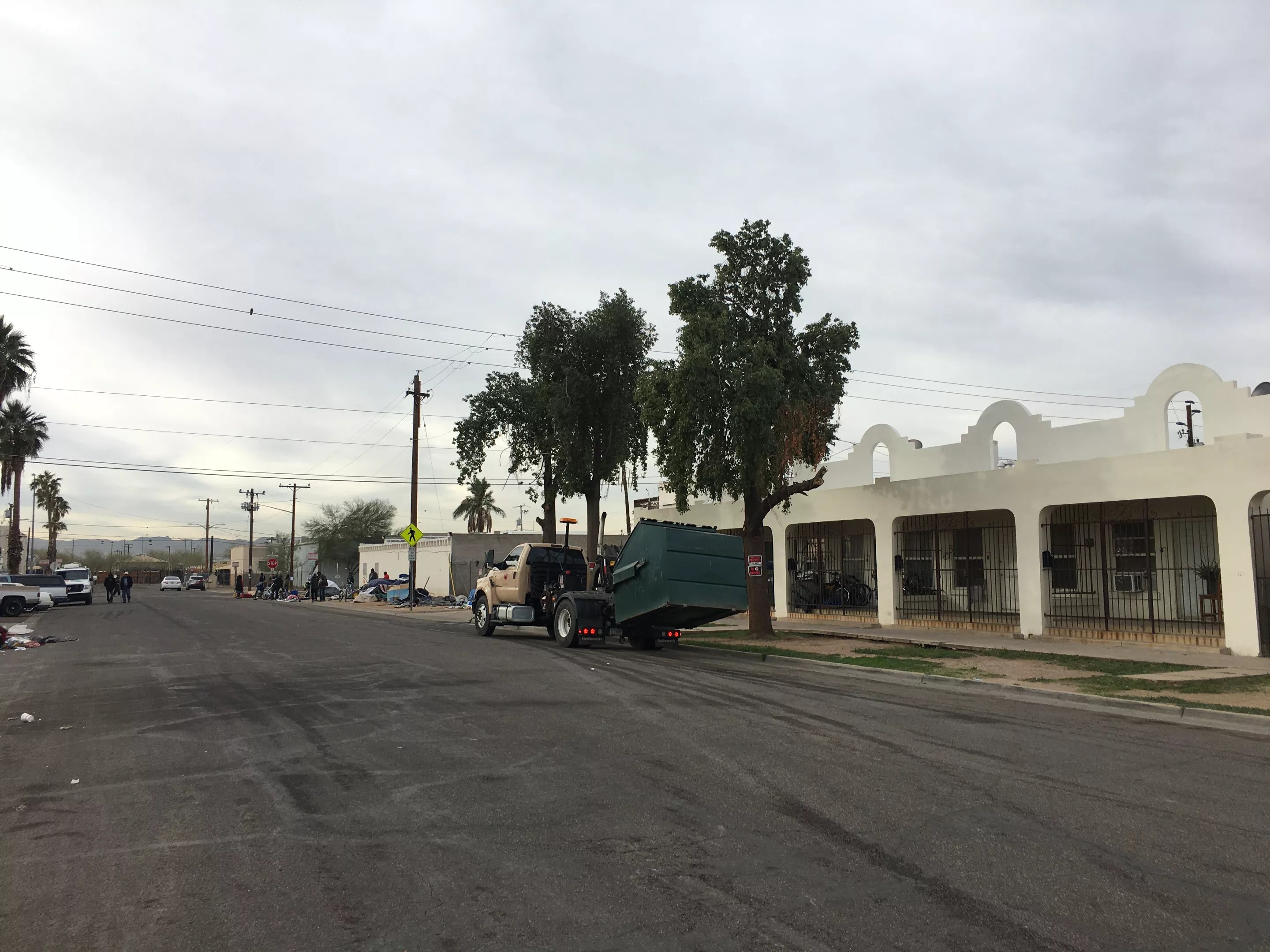
Elizabeth Whitman

Audio By Carbonatix
For Emily McKenney, Wednesday began with the low blare of a police horn shortly before sunrise, rousing her and her fiancé, Corey Wright, in their tent off 11th Avenue, south of Jefferson Street.
Police began telling the hundreds of people camped there that they needed to gather their belongings and leave, she recalled later that morning. They’d heard the same message a day before, when police came through with a loudspeaker and said everyone needed to be out by 9 a.m., or else face arrest.
The hundreds of people who camp and sleep in that area, in the shadow of Phoenix’s largest, consistently full homeless shelter, have come to expect weekly cleanings. This Wednesday, though, was different.
“It’s not usually like this,” McKenney told Phoenix New Times.
In the past, the city has simply cleaned up around the people, their tents, and their belongings. This time, police told people like McKenney and Wright that they have to gather their belongings and get out of the way.
Wednesday’s cleaning, for which city workers brought assistants from six outreach agencies, raises legal questions. A ruling by the U.S. Ninth Circuit Court of Appeals that was effectively sustained by the U.S. Supreme Court in December declared that police could not arrest people for sleeping in the streets if there were no available shelter beds.
The question of whether threatening people with arrest if they don’t move their tents and belongings violates the Ninth Circuit’s ruling remains “unsettled,” said Kevin Heade, a lawyer and member of the Central Arizona National Lawyer’s Guild.
Tamra Ingersoll, a spokesperson for the city of Phoenix, said the city’s attorneys were still reviewing the ruling but that police would not arrest people for violating the city’s urban camping ordinance, nor would the city prosecute such violations.
For Phoenix and the Valley, where numbers of homeless people are increasing but shelter beds and affordable housing are not, four perspectives from Wednesday morning’s cleanup lay bare the tensions over a longstanding issue with no end in sight.
The Couple
McKenney sat, subdued, on the northwest corner of 11th Avenue and Jefferson, with Wright’s Akita mix, Katy. Surrounding her were folding chairs, a black bin, tent poles, stacks of blankets, and a few large, black plastic bags and backpacks stuffed with belongings.
Public Works trucks and police SUVs, their lights quietly flashing, sat along 11th Avenue and to the south, along Madison Avenue. Two officers stood near a man in a tent, talking with him about clearing out.
A man in a green jacket strode by. “That’s private property, you know!” he warned McKenney, telling her to move her things.
McKenney sighed. “I will move it as fast as humanly possible,” she said under her breath. Wright, who had been talking with police, returned. McKenney recognized one of the officers and rose to give him a hug.
Wright, who is 31 and told New Times he was on disability because he is SMI (shorthand for “severely mentally ill”), began helping McKenney lug their belongings to the other side of the street, next to a fire hydrant. There, on public property, they could stay until the sidewalk had been cleaned and they could pitch their tent again that night.
McKenney, 38, said she had been homeless for about six months. She spoke in a low murmur, and wore sunglasses and a Sun Devils baseball cap. Most of the time, she looked down, toward the ground.
She recited a long list of her mental health issues: borderline personality disorder, bipolar disorder, anxiety, depression, and suicidal thoughts. “I think that’s it,” McKenney said, before quickly remembering to add severe PTSD to the list.

Emily McKenney and Corey Wright, with Wright’s dog, Katy.
Elizabeth Whitman
McKenney said that although she had sought help through Community Bridges Incorporated, a nonprofit with which the city contracts to provide services to people who are homeless, they hadn’t done much for her.
“If you don’t go to them for 30 days, they close your case,” she said. McKenney often forgot to go to appointments, and even though she agreed to be tracked down if she missed one, no one ever came looking for her, she said.
“It doesn’t seem like that difficult a thing to do,” McKenney said about making appointments. “But if you’re having a bad day, your thoughts are getting to you, you’re in the hospital…” She trailed off.
The City of Phoenix
Tamra Ingersoll, a spokesperson for the city, scanned north up 12th Avenue, which by 10 a.m. Wednesday had been cleared of tents but was still strewn with the detritus of clothes and plastic cups and milk crates and plastic bottles and inner tubes for bicycles. A few TV cameras faced the same way, capturing the view.
Street cleanings happen every Wednesday, Ingersoll told New Times. “The goal is not to collect property but to temporarily have possessions and people away from the area so it can be cleaned and sanitized,” she wrote in a subsequent email.
The city had also planned to spray the sidewalks that morning – “a bleach solution because of neighborhood concerns about the fecal matter,” she explained – but the contractor informed the city on Tuesday that they couldn’t make it.

No tents remained on the sidewalks of 12th Avenue, south of Jefferson Street, on Wednesday morning.
Elizabeth Whitman
Ingersoll emphasized that the cleanups were a weekly event, and that the only differences between this week and others were the street sweepers and the six outreach groups that were there to try to connect people with services. The outreach will last for a total of three days, she added.
As of Wednesday evening, one person who had an outstanding warrant had been arrested, Ingersoll confirmed. She also said that nobody’s belongings were being confiscated or thrown out.
“One of the nearby nonprofit groups often assists by creating a holding place for items,” she said. “Should any items be left on the street and/or sidewalk they become unclaimed property and are removed.”
Wright, however, said he had a propane heat lamp that was lost during the cleaning. “They just threw that shit away,” he told New Times.
The city is still tallying the number of people its agencies contact this week, as they continue their outreach through Friday.
Heade, with the Central Arizona National Lawyer’s Guild, said he thought the city should be forced to accommodate homeless people in a place that offered infrastructure and facilities – which the encampment in downtown Phoenix does not.

Hundreds of people were told to decamp and clear their belongings to allow for street cleaning.
Elizabeth Whitman
The Local Homeowner
Roger Hawkins, the man in the green jacket who told McKenney she was on private property, lives on 11th Avenue, in a row of several apartments whose front porches are all barricaded with thick bars and No Trespassing signs.
He’s been there for 14 years, he said, and while a few homeless people were always about – it’s a block away from a shelter, after all – it’s never been quite like this. The streets and sidewalks had become dirtier and more crowded, he said, ever since the day after Thanksgiving, when three large trucks came by and distributed tents and sleeping bags to people.
Hawkins’ neighbor, Darryl Beck, insisted several times he had absolutely nothing against homeless people.
But, he said, he was sick of the mess they made and the danger they created. He said he’d been assaulted and badly hurt. When he walked in the area, “I smell feces and urine,” he said, pointing out a specimen a few feet away.
“We are enabling them,” Beck declared, saying he and his neighbors just wanted the city or the shelter to create overflow areas. “We live down here in the trenches.”
Hawkins ducked into his house and emerged with a bound report, called “Health & Safety Crisis Ground Zero: Homelessness in the Capitol Mall Neighborhood,” from the local Madison Pioneers Coalition Neighborhood Association.

Residents in the area have barricaded themselves with thick bars and warning signs.
Elizabeth Whitman
Residents face daily health and safety hazards, the report said, including human defecation (with close-up photographic evidence), visible public drug use, visible public sex, assaults, violence, and threats. The report also described accumulating trash that was “Out of Control!!” and lured rats.
In its report, the association demanded that the nearby Human Services Campus, which includes the Central Arizona Shelter Services, open up internal overflow areas to get people off the sidewalks. It suggested the city transfer curb-to-doorstep land to property owners, so that police, who currently cannot enforce urban camping laws on public property, could “enforce no camping on private land.”
In the long run, the report suggested that the city spread shelter beds throughout Phoenix, rather than concentrating them in the area just southeast of the capitol – their neighborhood – and develop protocols for helping people with mental illness and addiction.
Despite its alarmist and frequently callous language, the report managed to neatly summarize the problem: “No One Claims responsibility, neither the City of Phoenix or the Homeless Shelters, therefore the Problem Gets Worse.”
The Director
One avenue over, dozens of tents were crammed into a fenced-off parking lot owned by the Human Services Campus. The entrance to the campus was one block south.

Tents are crowded into a parking lot belonging to the Human Services Campus, during Wednesday’s cleaning.
Elizabeth Whitman
Amy Schwabenlender, the executive director of the campus, said she received notice just last Friday about this week’s sidewalk cleaning. It wasn’t enough time for staff at the Human Services Campus, who work regularly with many of the people who live in the encampment, to prepare, she said.
“I wish we would’ve had more notice and conversations,” she said. She called the operation a disruption, saying it caused anxiety among people whose lives are hard enough already.
Ingersoll, the city spokesperson, told New Times in an email, “There was a meeting held on Jan. 22 where stakeholders were invited to discuss the plan. Several stakeholders attended the meeting and were asked to participate with the city.” She did not elaborate further.
Schwabenlender confirmed that police had warned people they would be arrested if they didn’t move on this Wednesday morning.
“Any other Wednesday, people have not had to move all their tents,” she said.
Behind the parking lot where everyone was crammed stood a brick building painted yellow. It was once an overflow shelter for men, Schwabenlender said. But it closed down several years ago.
As New Times reported at the time, in March 2015, the county shuttered the building after the state fire marshal discovered code violations that were deemed not worth fixing.

The number of unsheltered people on a single night in Maricopa County eclipsed 6,600 in 2019.
According to regular Thursday surveys by the Human Services Campus, an average of 280 people live in the area around the campus. The highest number ever tallied was 405 people, Schwabenlender said.
CASS, the main shelter at the campus, can hold 470 people, she said, and it is always full.
Annual counts of unsheltered people in Maricopa County have risen in recent years, with the 2019 count surpassing 6,600 people.
In January 2019, the Human Services Campus filed an amendment with the city to expand its capacity to 700 people. That application is still in process.